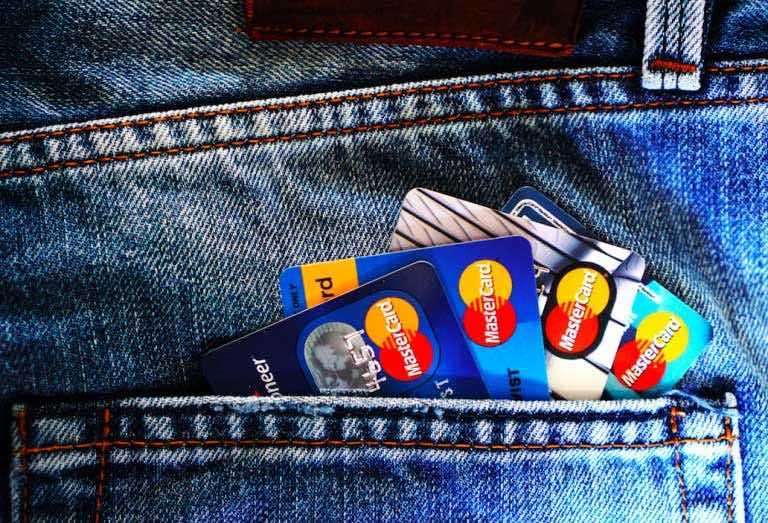5 Reasons to Have A Credit Card
Many people are afraid of credit cards, and these concerns often have legitimate roots, including anxiety about possible credit card fraud or identity theft, concerns about fees and interest rates, and worries about overspending. In fact, a report from CreditCards.com revealed that millennials fear debt even more than they fear dying.1
But when used appropriately, credit cards can help, rather than hinder, you in your financial journey. And contrary to popular opinions on debt, many people successfully use credit cards to establish a strong credit history, improve their personal finances, and gain financial freedom and security.

Here are just a few things credit cards can help you do.
Build Good Credit
Your credit score is the gateway to getting approved for necessary financial products, including future credit lines, personal loans, mortgages, and more. But we don’t automatically enter adulthood with a good credit score! It has to be built over time through responsible credit ownership and usage, including a strong repayment history and varied credit use.
A low-limit credit card can help you get started on your credit journey and build a good score, which can open other doors for you in the future. It can also help you rebuild your credit if you’ve fallen on hard times and/or had slip-ups like making a late payment, missing a payment entirely, or submitting too many credit applications in a short time.
Take Care of Everyday Expenses
Approximately 31% of credit card users are “transactors,” or shoppers who regularly use their credit cards and pay their balances in full each month.2 Using a credit card for everyday purchases - assuming you pay your balance off before interest accrues - has several benefits, including:3
- Peace of mind. Credit cards generally have stronger fraud protections than debit cards and are far more secure than cash. Whereas cash is gone for good if someone takes it from you and fraudulent debit transactions take money from your checking account that can take a while to get back, credit card fraud doesn’t immediately and directly affect your bank account.
- Tracking and budget awareness. Each credit card transaction goes onto a “statement” that lists every purchase you’ve made within a specific month or billing cycle. This makes it easy to track your spending and adjust your budget as needed.
- Build credit quickly. We’ve already established that your credit score is important! Using your credit card often and making on-time payments is a great way to rapidly build credit.
Handle Surprise Expenses
Although they’re not fun to think about, surprise expenses like car repairs, medical bills, and unexpected trips are a part of life for all of us. And in an era where recessions and their economic effects (e.g. pay cuts, hour reductions, layoffs) are always possible, it’s good to have a backup plan in case your normal source of income is disrupted. If you’re not adequately prepared for these events, they can have a major impact on your finances and overall life.
An emergency fund is the best way to pay for surprises, but for the nearly two-thirds of American households living paycheck-to-paycheck,4 building that fund can be difficult. If you don’t have an emergency fund, or your savings are insufficient to cover emergencies, a credit card can help. Some financial experts even recommend having a specific credit card – ideally, one with a low interest rate and little or no fees – set aside just for emergencies.5
Fund Major Purchases and/or Projects
Many people want to update their homes with a new chair or sofa, improve their backyard with a hot tub or patio furniture, or get pricey, splurge-worthy items; but they may not have the money to pay out-of-pocket. Credit cards provide a way to finance these items and achieve the life you want.
However, anyone using a credit card to pay for major purchases and/or projects should know they may pay more in interest than they would with other options like personal loans. If you can qualify for a personal loan, such as those available through Upgrade, you may save on interest.
Earn Rewards and Perks
Nearly 120 million Americans have at least one rewards card, or a credit card that offers “perks” for using it.6 As long as you make your payments on time and pay your balances in full, a rewards card can help boost your budget by rewarding you for doing things you’re already doing and making purchases you’re already making.
Rewards typically come in one of four ways: cash back, store rewards, travel rewards, or cryptocurrency. Others may not offer rewards in the traditional sense but could offer non-monetary perks.
- Cash back cards are a good one-size-fits-all option if you want rewards you can use everywhere and for everything. Simply put, these programs reimburse you for a certain percentage of what you spend (typically between 1 and 2%, or $1 to $2 for every $100 you put on the card.) In rare cases, such as the Upgrade Cash Rewards and Triple Cash Rewards Cards, you earn cash back on payments rather than charges, which makes responsible credit use easier and more rewarding.
- Store rewards cards are tied to a specific retailer and offer “cash back” in the form of rewards for that retailer. If you have a favorite store, a rewards card from them could help you get more of the products you love for a lower cost! Keep in mind that there are two types of store credit cards - “open-loop,” which you can use anywhere, and “closed-loop,” which you can only use at the retailer that issued the card. If you want a store rewards card but are worried about overspending and going into debt, a “closed-loop” card can help you earn rewards while curbing the temptation to spend.
- Travel rewards cards, as the name suggests, are a great option for globetrotters, frequent flyers, and travelers of all stripes. They offer reward “points” consumers can exchange for airline miles, hotel stays, and other traveling essentials.
- Other credit card perks may not be monetary, but could benefit your budget nevertheless. Examples of these perks include insurance on car rentals (assuming you use that card to book the rental), roadside assistance in case of car breakdowns, and warranties and/or protection plans on major purchases.
The Bottom Line
Don’t be afraid to use a credit card! Through careful use, steady repayments, and a controlled cycle of usage to payment, you can harness the power of credit cards to build good credit, handle surprise expenses, fund major purchases and/or products, and earn perks and rewards. Use Upgrade’s Credit Health monitoring tool to stay on top of your finances and keep a continual eye on your credit.
- The 5 Big Credit Card Fears and How I Overcame Them, CreditCards.com
- Credit Card Usage and Ownership Statistics, ValuePenguin
- Why Nearly Every Purchase Should Be On a Credit Card, NerdWallet
- Despite Rising Wages, 61% of Americans Are Still Living Paycheck-to-Paycheck, CNBC
- 5 Things to Look For In A Credit Card for Emergencies, The Motley Fool
- Chasing Points: How Many of Us Use A Credit Card Just for the Rewards?, Credit.com


